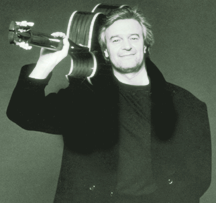

[ Metro | Metroactive Central | Archives ]
Quieting Down
Hard Ax to Follow: Guitarist John McLaughlin
Guitarist John McLaughlin mutes his past
By Nicky Baxter
When I finally got a copy of guitar demigod John McLaughlin's freshly minted tribute to John Coltrane, After the Rain (Verve), I was giddy with anticipation. McLaughlin's notoriety as one of the chief architects of rock fusion kicked into high gear with the Englishman's astonishingly original work with Miles Davis at the dawn of the 1970s. Before McLaughlin, jazz guitarists bumped a predictable, quiet sound. McLaughlin's atom-smashing volume changed all that.
His tenure with Davis and stint in Lifetime, a collaborative venture with percussion prodigy Tony Williams, cracked the old mold; with the formation of the rock 'em, sock 'em Mahavishnu Orchestra, he trashed it altogether. Supercharged solo outings like Electric Guitarist and his mid-'80s resurrection of the Mahavishnu Orchestra affirmed his standing as the dean of high-decibel jazz fusion.
But I'd conveniently ignored the guitarist's later pattern of pastoral sonic explorations: the low-fi collaborations with European classicists Al DiMeola and Paco De Lucia; the experimental East Indian-inspired sound of Shakti; the pan-European revelations with percussionist Trilok Gurtu.
Certainly, McLaughlin's quietly elegiac tribute to Bill Evans from three years ago ought to have triggered a warning that the brain-rattling volume of earlier periods had been forsaken for (gasp!) what appeared to be the self-same quiet conservatism the Yorkshire native helped dislodge nearly three decades ago. On After the Rain, he invites Elvin Jones and young organist Joey DeFrancesco along for a smooth-sailing journey through the past, with the guitarist recalling his pre-Milesian period, when he was cutting his teeth on Django Reinhardt, Tal Farlow and Art Blakey's Jazz Messengers.
Before his fusion days, McLaughlin played with the Graham Bond Organization and organist Brian Auger's quintet. Revealingly, McLaughlin's current fascination with the guitar-organ-drum configuration dates at least as far back as the late-'60s trio Lifetime, with Williams, McLaughlin and organist Larry Young. The Free Spirits Featuring John McLaughlin: Tokyo Live (1994) again discovered the joys of the trio format. Free Spirits consisted of P-Funk alumni Dennis Chambers on drums and DeFrancesco.
No doubt McLaughlin meant well when he recruited Jones for the Coltrane tribute; but Jones, perhaps following his employer's lead, is uncharacteristically subdued, and DeFrancesco's Hammond B-3 merely regurgitates old Jimmy Smith/Jimmy McGriff licks. McLaughlin's own playing is tasteful yet dull, uninspiring.
The trio's take on tunes written or associated with the fire-breathing saxophonist/composer lack the visceral appeal so central to the Coltrane canon. It is something of a paradox that, for many years, Coltrane was frequently acknowledged as McLaughlin's musical (and quasispiritual) guru. Maybe it's age (McLaughlin's in his mid-50s now), or perhaps he's simply lost interest in his supersonic youth.
Whatever the case, donning yesteryear's raiments, After the Rain evokes not renewal but rather retreat. One can only hope that the return of funky drummer Dennis for tour duty will rekindle the spark that eludes McLaughlin here.
[ Metro | Metroactive Central | Archives ]
This page was designed and created by the Boulevards team.

Photo by Bettina Rheims
From the Feb. 8-14, 1996 issue of Metro
Copyright © 1996 Metro Publishing and Virtual Valley, Inc.